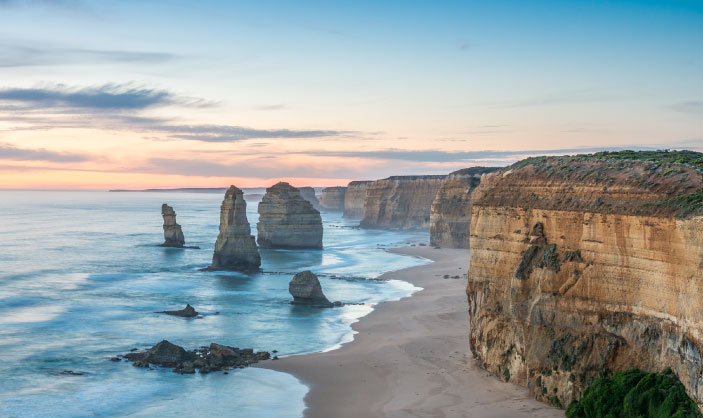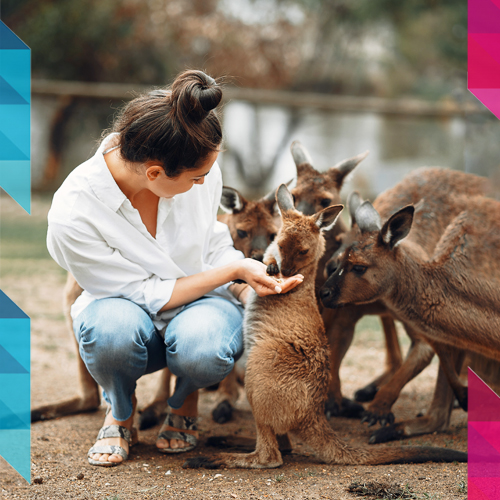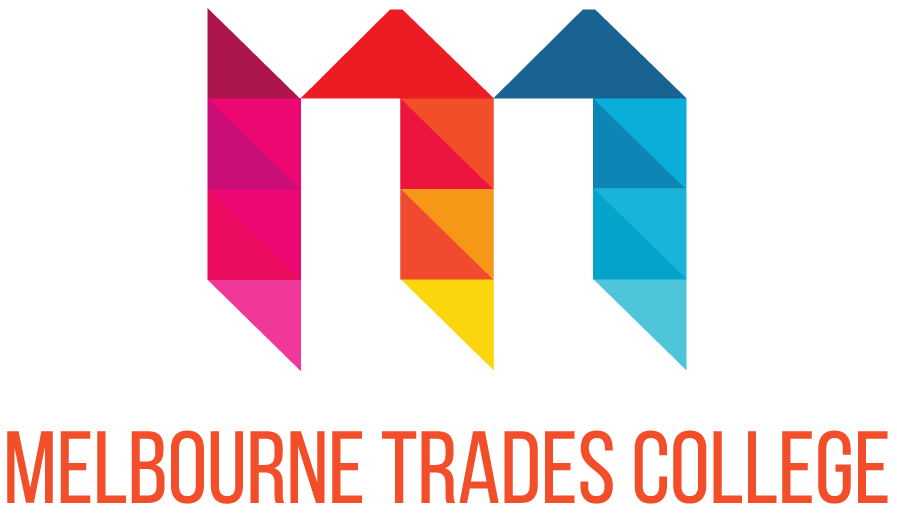
Living In Australia

Australia is an ethnic melting pot. It is a country known for its world-famous natural wonders, diverse landscapes and a vibrant multicultural society that practices almost every religion and lifestyle. Since 1945, more than six million people from across the world have come to Australia to live.
There are 226 languages spoken in Australia – after English, the most popular are Italian, Greek, Cantonese and Arabic. The island continent is almost as big as the USA but has a population of approximately only 25 million people (most of whom live within 50 kilometres of the coast). Australia’s coastline stretches almost 50,000 kilometres and has more beaches (over 10,000) than any other country. Inland, there are vast areas of semi-arid and desert areas.

Melbourne has a temperate climate with four distinct seasons:
- Winter (June - August) Temperatures range from 10-15°C
- Spring (September - November) Temperatures range from 17-22°C
- Summer (December - February) Temperatures can rise above 35°C
- Autumn (March - May) Temperatures range from 17-24°C


More than 100 ethnic groups are represented in Australia, making it one of the most culturally diverse countries in the world. Australia’s dynamic multiculturalism can be attributed to its unique combination of indigenous cultures, early European settlement and immigration from all parts of the world.
Australians value the wealth of cultural diversity and social sophistication that international students bring to our campus and communities. Melbourne Trades College takes great care in looking after international students and helping them to adjust to the Australian way of life. International students also gain great benefits from their education in Australia and make lifelong friendships.


Website : www.melbournetradescollege.vic.edu.au
Email : info@melbtc.vic.edu.au
Phone : 03 7066 5255
(shared accommodation) : A$185.00 - A$440.00 per week (unfurnished)
Useful internet sites for student housing are:
https://homestaydirect.com.au/
http://www.studymelbourne.vic.gov.au
Useful rental accommodation websites are:

Useful Websites

Melbourne has a temperate climate with four distinct seasons:
- Winter (June - August) Temperatures range from 10-15°C
- Spring (September - November) Temperatures range from 17-22°C
- Summer (December - February) Temperatures can rise above 35°C
- Autumn (March - May) Temperatures range from 17-24°C


More than 100 ethnic groups are represented in Australia, making it one of the most culturally diverse countries in the world. Australia’s dynamic multiculturalism can be attributed to its unique combination of indigenous cultures, early European settlement and immigration from all parts of the world.
Australians value the wealth of cultural diversity and social sophistication that international students bring to our campus and communities. Melbourne Trades College takes great care in looking after international students and helping them to adjust to the Australian way of life. International students also gain great benefits from their education in Australia and make lifelong friendships.


Website : www.melbournetradescollege.vic.edu.au
Email : info@melbtc.vic.edu.au
Phone : 03 7066 5255
(shared accommodation) : A$185.00 - A$440.00 per week (unfurnished)
Useful internet sites for student housing are:
https://homestaydirect.com.au/
http://www.studymelbourne.vic.gov.au
Useful rental accommodation websites are:

Useful Websites
Latest news
Subscribe to our newsletter
Living in Australia – Make the tab or informative part for this section
Australia Australia is an ethnic melting pot. It is a country known for its world-famous natural wonders, diverse landscapes and a vibrant multicultural society that practices almost every religion and lifestyle. Since 1945, more than six million people from across the world have come to Australia to live. There are 226 languages spoken in Australia – after English, the most popular are Italian, Greek, Cantonese and Arabic. The island continent is almost as big as the USA but has a population of approximately only 25 million people (most of whom live within 50 kilometres of the coast). Australia’s coastline stretches almost 50,000 kilometres and has more beaches (over 10,000) than any other country. Inland, there are vast areas of semi-arid and desert areas. All major cities, and the nation’s capital, offer exciting lifestyles, great cultural attractions, and a safe quality of life. Multiculturalism More than 100 ethnic groups are represented in Australia, making it one of the most culturally diverse countries in the world. Australia’s dynamic multiculturalism can be attributed to its unique combination of indigenous cultures, early European settlement and immigration from all parts of the world. Australians value the wealth of cultural diversity and social sophistication that international students bring to our campus and communities. Melbourne Trades College takes great care in looking after international students and helping them to adjust to the Australian way of life. International students also gain great benefits from their education in Australia and make lifelong friendships.

